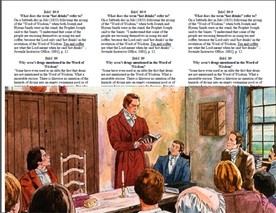Tag Archive: LDS Seminary
Group wall post by Carole Walter Jones
I had a student who’s father died this AM after a long illness. I think tomorrow’s lesson will need some adjustment…

A couple ideas: Did the youth in your class know the father? Perhaps they could write experiences they had with him and how he had made a difference in their lives. It would be a comfort for his family. You could put together a freezer meal or two to deliver to the family. At times of grieving, it can be a comfort to just pull something easy from the freezer that you pop in the oven or slow cooker. And know that it was made with love by someone who cares.4Oh wow, I couldn’t imagine. Everyone get ready to hug the student when he/she comes back to seminary. Kendra, had some great suggestions up above. If you need more time, spend each day the rest of the week doing something each day.1I would go with some ideas but let the kids take the lead on this one. I suspect that they will have really good insight as to how to best help.5My father died of cancer when my brothers were all young. Two were on missions and one of them was still in high school and it was the love and support of his friends that ultimately kept him from exploding with anger at the unfairness of the situation. They kept him close enough that although he started making poor choices, he never lost his connection to the church. He needs to have friends that he can express himself to without being judged and he needs love… lots of unconditional love. Especially after the funeral when things calm down. That is when he will need the most support. Cards and notes express love in a way that he can read them in private and break down if he needs to without feeling ashamed for crying in front of others. .. just my two cents based on personal experience!6i think this talk really covered it well
www.lds.org/general-conference/2012/10/because-i-live-ye-shall-live-also?lang=engi know that you wonder why the world is still turning. it seems impossible that life is still going on when such a tragedy has happened.
one of the important things for the other kids to know is that nothing you say will make it ok. is is never going to be ok. don’t try to make it ok. you do learn to live differently. you adjust to them not being physically there. that is ok.2D&C 42:45-46
“Thou shalt live together in love, insomuch that thou shalt weep for the loss of them that die…And it shall come to pass that those that die in me shall not taste of death, for it shall be sweet unto them”My cousin died this last year and these scriptures brought me such comfort. My class had a really good discussion about the sorrow and the beauty of death and the joy of the gospel. It’s okay to be sorrowful, in fact we should be at times. I think kids need to know that just as much as they need to know that we move forward by letting go of our sorrow and focusing on the light of the resurrection
1How about having the class look for scriptures of comfort regarding loss and trial and write testimonies or their thoughts with the scripture. They could then be put together in a book for the student.1How about Elder Uchtdorf.
“In light of what we know about our eternal destiny, is it any wonder that whenever we face the bitter endings of life, they seem unacceptable to us? There seems to be something inside of us that resists endings.”
www.lds.org/general-conference/2014/04/grateful-in-any-circumstances?lang=eng
How do you cover all the principles in a lesson?

How many do people usually plan to cover in a lesson.
Is it possible to cover them all or even necessary to get through them all.
Would be great to hear peoples thoughts on this.
I try to cover most of them. I discovered post-it-notes are a great way to have the kids add the principles in to their scriptures.Best advice I ever got as a teacher: Remember this won’t be the only time the kids read the (insert book of scripture here). I would recommend you NOT try to cover all 5-6 principles, or you’ll end up teaching lessons each day rather than teaching your students.We are to teach students, not lessons.
Prayerfully select 2-3 (max) of those principles to discuss and go about your lesson prep accordingly. Remember who you’re teaching and what the individual needs of your students are. If you’re in touch with your parents (and you had better be!!!) you’ll hopefully have some insights from them about topics from the home you can help reinforce, assisting in your selection process.
But, again, never more than 2-3 of those principles each day. 5-6 is WAY too cluttered a lesson – you really don’t have time to search, analyze and apply all 5 or 6 principles in a single class period.
10I try to cover them all, most of them link together, I always put them all up on the board. I’ve found that I stick to the manual, do what it says we have fun, and they seem to get it all. They all passed the assessment without any bother. Sometimes depending on the material if there seems to be a lot I put them in a list form or if only a few I put them up separately as we cover them x4Lucy-Jo Harris I don’t know how you find the time to teach all the principles especially as you are teaching everday!
Are you looking forward to friday!2I usually hit 2-3 principles. Many times just 1. I want to be able to say “Today we learned …” at the end of the lesson to reiterate the main few points we made. My goal is that no one leaves my class unable to state in a sentence or two what they learned in Seminary/Gospel Study.9That Jenny Smith is just what I have been feeling today as I studied 90-92.2I only cover a couple of them. At the end of class we always have “on the spot” and whoevers’ turn it is needs to summarize with principles learned that day.3I find that the manual makes too many points and has no conclusion, leaving students to wonder what they learned. I have to add in that clear structure as a teacher, selecting from a few points, which, BTW, is the instruction from the GTL:“In a normal scripture block there will almost always be more material than can be meaningfully discussed in a class period. Once teachers have studied the scriptures and the curriculum, they need to decide which doctrines and principles are the most important for their students to understand and apply.”
4I think the manual intentionally presents several points or principles for each block – it’s not done with the intent we touch on each of them, though, but to provide teachers a number of options from which to choose as they prepare lessons. I actually LOVE that the manual provides 5-6 principles in each lesson. It helps me really think about whether I’m getting everything I can out of my personal preparation so I can respond appropriately to questions in class.It also helps me articulate and focus on the one or two principles I might choose that day….
7And also “During lesson preparation, teachers should give sufficient time and effort in deciding both what to teach and how to teach. If what to teach gets almost all of the emphasis during lesson preparation, a teacher will not have sufficient time to consider how to help students participate in learning. Often this will result in lessons that are boring and too teacher-centered. When a teacher focuses too heavily on how to teach, lessons can become disjointed, lacking purpose and power.” from the GTL5The problem I am having is now the tests. What if the one thing I don’t get to in the lesson is one of the things chosen for the test?? I feel like I need to teach for the test now that we’ve had the first one and I feel like I didn’t emphasize enough of a few things from the test. I even remember those lessons thinking they were great, but then my kids didn’t get that one point needed for the test. :(2I wouldn’t worry about that, Pamela. I know across our stake, I’ve been interested to see that some classes miss a particular question heavily while other classes miss other questions. Each class managed to pass the test overall just fine.With the assessment, as I told parents/teachers/kids over the weekend at our stake YM/YW/Seminary event, it’s not a matter of passing or failing or teaching to the test – it’s an opportunity for the kids and parents to find out what gospel principles are being grasped well and what principles need more time at home.
Remember: you’re not responsible to teach the kids the gospel; that’s what their parents are for. You’re there as a resource and a support for the kids. Do we teach the gospel? ABSOLUTELY! Nothing BUT the gospel and it’s correct principles. But don’t teach to the test at all – just keep teaching the scriptures and the rest will come along just fine.
4Sometimes we are able to cover all of them, but not all the time. I have the students figure out the doctrine and principles within the verses. Today for example, we were able to cover around 3, which wasn’t all of them. But that’s okay.Have you looked through the second one yet?Many of the principles/doctrines are covered in multiple lessons. I try to make sure I cover the ones that may not be covered in other lessons, as well as the ones I fell are needed for the lesson that day. Eg: one that crops up quite often is along the lines of “The Lord speaks to us through … the Holy Ghost”1When I pray about the lesson, I always teach the principals that stand out to me. It’s always fun when one of the kids has a thought or in their prayer mentions the ones I have been praying about. I love teaching seminary.2This week, I recently started giving one of the verses (that has a principle or doctrine stated within the lesson) to a student for their devotional. So when it comes that time, I hand it over to them for that portion of the lesson.1Hahah Emma Pearson I’ve managed to get out of Friday we’re at a funeral out of town 😜 as for the principles I’ve found that there are never more than 5 and I dunno it just works xxxI do try to focus on the principles and often write an outline on the board using the principles. The best thing that has helped me, though, is to do what Judy Goodman wrote above – pray and teach the ones that stand out and to remember something my husband told me: They will be studying the D&C the rest of their lives, we don’t need to teach them everything.21 principle with a great, memorable discussion and food for thought is worth 5-6 covered principles that elicit no discussion and bore the kids to sleep or feel like you’ve rushed the spirit.
D&C 89 Word of Wisdom Glue-in

Here is a glue-in for the Word of Wisdom that addresses two fairly common concerns. First is concerning “hot drinks” in verse 9 and why Tea and Coffee are not specifically mentioned in Section 89. The second quote is concerning drugs and its place in the Word of Wisdom. dc_89_gluein.pdfFile Size: 134 kbFile Type: pdfDownload File […]
Group wall post by Amy Stuart Wolcott

My class has really enjoyed the “mad fans” cards.Ever heard the joke “Why is 6 afraid of 7?” – “Because 7 8 9!”
Well 6 no longer has to fear…3D&C:6 Look up, God will fix. D&C: 25 Covenants alive. These come from the SM Magic Square.2Six in French sounds like “cease”; D&C 6: cease doubt. 25: keep covenants aliveWe say: “Doctrine & Covenants section 6…doubt not, fear nix.” For 25 we say, “Doctrine & Covenants 25…cleave to your covenants so you can thrive.” They work like a charm! Love, love, love SMs.I point out that the reference 6:36 is like a face. The sixes are eyes that remind us to look unto Christ. The 3 is a nose.3Hey I was just going to say what Lydia said! That’s what we do. Also, Keeping covenants helps you be clean in D&CD 25:13.My kids came up with D&C6 Jesus Christ will fix and D&C 25 Keep your covenants alive.Thoughts on Christ affix. D&C section Six. Then 25:13 my kids came up with on average people make a marriage covenant at 25 or they said the 13 looks like a hand cleaving to the iron rod.1If we don’t cleave unto the covenants, we won’t make it to our 25th anniversary. The 13 Articles of Faith help us do that.1Brilliant! Thanks all!One of my students pointed out there was a street sign that said something like “drive 25 – keep kids alive” Great for D&C 25 “Keep Covenants alive”
Link: D&C 76 Game – The Red Headed Hostess
Link: D and C 76 Game – The Red Headed Hostess
Group wall post by Wendi Gunn

This could go well with #DandC81…where we are talking about the role of the First Presidency or Stake Presidency and Bishoprics and then it talks about presidency callings throughout the ward…maybe I’m stretching it, but when these people are put into these callings, do we support them and help them with their calling? Or do we only support those that we like? We are called upon to sustain these leaders within our wards and stakes, but do we truly support them when they need us to? Also for counselors to support the Bishop and help him do his calling in the best way possible. And for any presidency to have the help they need from their counselors in helping them do their calling the best way possible…DandC81:5 “Wherefore, be faithful; stand in the office which I have appointed unto you; succor the weak, lift up the hands which hang down, and strengthen the feeble knees.” Thank you for posting this video…I think I will use it for this lesson.4The conference talk, “Are We Not All Beggars” came to mind when I watched this video. www.lds.org/general-conference/2014/10/are-we-not-all-beggars?lang=eng5I almost couldn’t finish watching it, made me extremely sad. :(I felt the same way!1Susan Kendrick thank you for the idea to use this for section 81. I used it today with the last section in the lesson manual about helping the poor. I started with this video and the kids had a hard time watching it. They were whispering about why no one was helping the homeless man. Then we focused a discussion on the lesson ideas for v 4-5. We then watched www.lds.org/general-conference/2014/10/are-we-not-all-beggars?lang=eng . The spirit was so strong and after we talked about what our impressions were while watching the video. One student who has been really struggling commented that he felt the spirit when Elder H was testifying of the importance of helping one another and at that moment he understood why the youth were asked to participate in service projects. It was such a huge win today. A student who was struggling, felt the spirit, recognized what he was feeling and then bore testimony of that in front of the other students… Boom!
Join the LDS INstitute Group

I love this vintage find because of the graphics, especially the typography on the title here. Because you’re joining Institute, but you’re also joining the “in” crowd. Get it? The text feels surprisingly relevant! It is a little dated, here and there (the “in group”) but most of the rest of it reads exactly like […]
Group wall post by Lollie Lyman Debenham
Learning Assessment Information

Here is the PDF of the presentation on the Learning Assessment I gave on Saturday. I hope it helps alleviate fears about giving it. Remember to talk to your coordinator about questions you have. I am also linking FORM A of the Learning Assessment. Most of the information from my presentation comes from the instructions in the form. Find out from your coordinator if you are to use FORM A or FORM B. I will post stuff from my D&C 121-123 presentation later as […]




